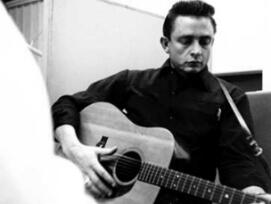The Man In Black: Remembering Johnny Cash
by paul jaissle
 With a music career that spans 5 decades, over 100 albums, and writing nearly 400 songs, Johnny Cash certainly needs no introduction: the unmistakable voice, style, and attitude Cash possessed made him the greatest interpreter of modern American song to ever live. His passing away not only marks the end of a remarkable life and the silencing of a legendary musician, it also serves as a reminder of the incredible and personal power that music has.
With a music career that spans 5 decades, over 100 albums, and writing nearly 400 songs, Johnny Cash certainly needs no introduction: the unmistakable voice, style, and attitude Cash possessed made him the greatest interpreter of modern American song to ever live. His passing away not only marks the end of a remarkable life and the silencing of a legendary musician, it also serves as a reminder of the incredible and personal power that music has.
Johnny Cash was one of the few artists who demanded immediate respect. He was the first "rock star": his hard living is the stuff of legend, but his lust for life was matched by his unwavering faith. And even though he was part of Nashville's conservative history, Johnny Cash was an outspoken opponent of the Vietnam War and always had an ear open and a song for youth, prisoners, sinners, and those who traditionally went voiceless. Clearly, Cash represented for millions -but more importantly, for me personally- the independent spirit of America, and to a greater extent, the emotions, struggles, and entire experience of life for all humanity. His voice could stop me in my tracks, a feat that only a few other musicians have ever been able to achieve. It was after hearing his 1996 release Unchained that I became absolutely fascinated with the man's music and his incredible life: I devoured any of his music could find, read and re-read his autobiography, and held Johnny Cash in the highest personal as both a musician and a human being.
No matter what music was moving me, whatever band I was enamored with at a particular moment in life, I was always able to hear Johnny Cash and be transported. How could a man I never met, never saw perform live, and whose career began nearly 30 years before I was born have a profound and deep affect on my life? The answer, obviously, was the music itself.
Throughout the years, Johnny Cash sang songs that celebrated the splendor of nature, the joy of true love, the struggles and hardships of society's downtrodden and all topics in between. The one constant of all these songs was Cash's ability to put his entire being and spirit into each note he sang. When he sings 'I shot a man in Reno just to watch him die,' he sounds like a convicted man: his voice is full of remorse for an act he never committed. When he tells his wife 'Because you're mine, I walk the line,' he sounds like he has devoted his entire existence to her, even if he does deliver the line with a slight sound of hesitation. Even when he says 'San Quentin, I hate every inch of you,' one hears the contempt he feels for the prison he visited only as a guest. That is what makes Johnny Cash such a tremendous figure in modern music. That gift for feeling every word he sang, whether he wrote it or not, is why we are still listening to his music, and why future generations will still find his music moving, magical, and absolutely essential.
Not enough can be said about how I feel about Johnny Cash, and I know I'm not the only one: his music touched millions worldwide. But where my words may fail to do justice to the man and his legend, his music speaks for itself. Keep listening. I know I will. Goodbye Johnny, we'll miss you.
Copyright (c) 2005 erasing clouds |
|